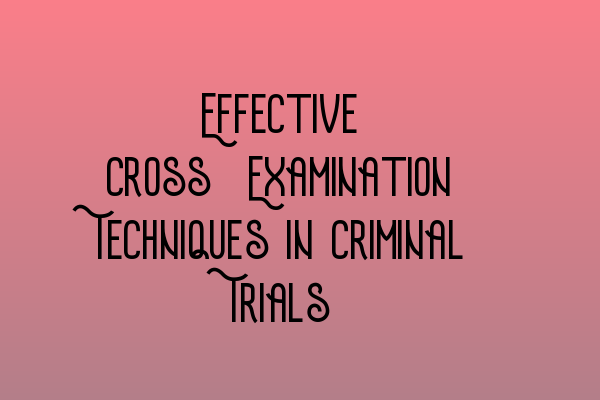Effective Cross-Examination Techniques in Criminal Trials
Welcome to SQE Criminal Law & Practice Law UK, where we provide comprehensive and specialized training for aspiring criminal law solicitors in the UK. In this blog post, we will discuss effective cross-examination techniques that can significantly impact the outcome of criminal trials.
Why is Cross-Examination Important?
Cross-examination plays a critical role in criminal trials as it allows solicitors to question witnesses presented by the opposing side. It aims to cast doubt on the witness’s credibility, expose inconsistencies in their statements, and highlight any bias that may exist. Effective cross-examination can weaken the prosecution’s case or strengthen the defense’s position, making it an essential skill for any criminal law solicitor.
Key Techniques for Effective Cross-Examination
1. Prepare Thoroughly: Before stepping into the courtroom, it is crucial to thoroughly prepare for cross-examination. Familiarize yourself with the case, review witness statements, and identify potential weaknesses or contradictions in the prosecution’s evidence.
2. Control the Witness: During cross-examination, it is important to maintain control over the witness. Ask concise and pointed questions to prevent them from elaborating or going off-topic. This allows you to extract the desired information while limiting the witness’s ability to provide damaging evidence.
3. Use Leading Questions: Leading questions are questions that suggest an answer or contain the information you seek. They are an effective way to direct the witness’s testimony and elicit the desired responses. For example, “Isn’t it true that you were not present at the scene of the crime?”
4. Expose Inconsistencies: Cross-examination provides an opportunity to highlight inconsistencies in the witness’s statements. Carefully analyze their previous statements and compare them to their current testimony. If you discover any contradictions, present them to the court to undermine the witness’s credibility.
5. Establish Bias: If there is any possibility of the witness having bias or a motive to lie, it is crucial to expose it during cross-examination. Dig deep into their background, relationships, or any other factors that may influence their testimony. By establishing bias, you can create doubt in the court’s mind regarding the reliability of their statements.
Final Thoughts
Effective cross-examination techniques are a powerful tool in the hands of a skilled criminal law solicitor. By preparing meticulously, maintaining control over the witness, using leading questions, exposing inconsistencies, and establishing bias, you can significantly impact the outcome of a criminal trial.
At SQE Criminal Law & Practice Law UK, we offer comprehensive SQE 1 and SQE 2 preparation courses to help you develop the necessary skills to succeed in your legal career. Don’t forget to check out our SQE 1 Practice Exam Questions and SQE 1 Practice Mocks FLK1 FLK2 to enhance your knowledge and test your understanding of criminal law.
For the latest SRA SQE exam dates and more information about our preparation courses, visit our SRA SQE Exam Dates and SQE 2 Preparation Courses pages. Join SQE Criminal Law & Practice Law UK to unlock your potential as a criminal law solicitor.
